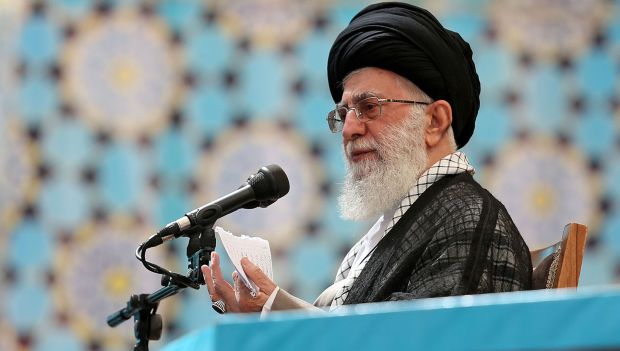
Iran’s supreme leader Ayatollah Ali Khamenei delivers a speech during a ceremony marking the 25th death anniversary of Ayatollah Ruhollah Khomeini, founder of the Islamic Republic, in Tehran June 4, 2014. (REUTERS/leader.ir/Handout via Reuters)
In a statement published on his website late on Monday, Ayatollah Ali Khamenei insisted that Iran needed facilities to be able to enrich uranium on an industrial scale, in the face of attempts by Western negotiators to get Iran to accept a much smaller capacity.
Iran is currently holding talks in Vienna with negotiators from the P5+1 (the five permanent members of the UN Security Council plus Germany) in a bid to resolve the dispute over Iran’s nuclear activities ahead of a July 20 deadline agreed by both sides. So far, reports say little progress has been made towards finding a final agreement.
The issue of Iran’s enrichment of uranium—a process that can be used to create fuel for reactors or the core of nuclear warheads—is currently at the heart of the dispute. The US and its allies are seeking a deal that restricts Iran’s enrichment capability in order to make it more difficult for the country to produce nuclear weapons.
Iran denies its nuclear program is designed to produce weapons, and says it wants to develop a full nuclear fuel infrastructure for a network of nuclear power plants.
In the statement,Khamenei said: “Their aim is that we accept a capacity of 10,000 separative work units (SWUs), which is equivalent to 10,000 centrifuges of the older type that we already have. Our officials say we need 190,000 SWU. Perhaps this is not a need this year or in two years or five years, but this is the country’s absolute need.”
SWUs measure the work done by uranium centrifuges to refine the metal so that it contains a higher concentration of the isotope Uranium-235, to the 5 to 20 percent needed for different kinds of nuclear reactors, or the 90 percent plus that is typically used in nuclear bombs.
Analysts said Khamenei’s statement underlined Iran’s existing negotiating position and his determination not to bow to western pressure, but left the door open to compromise.
Trita Parsi of the National Iranian American Council told London’s Guardian newspaper: “Iran wants to reclaim its dignity by standing firm in the face of what it sees as bullying. In that sense, the centrifuge numbers have taken on a much deeper and more worrisome meaning.”
“It’s interesting that he refers to what the experts say, rather than coming down hard with his own firm stance. Also, he keeps the timeline undetermined, which can open the way for compromise,” he added.
